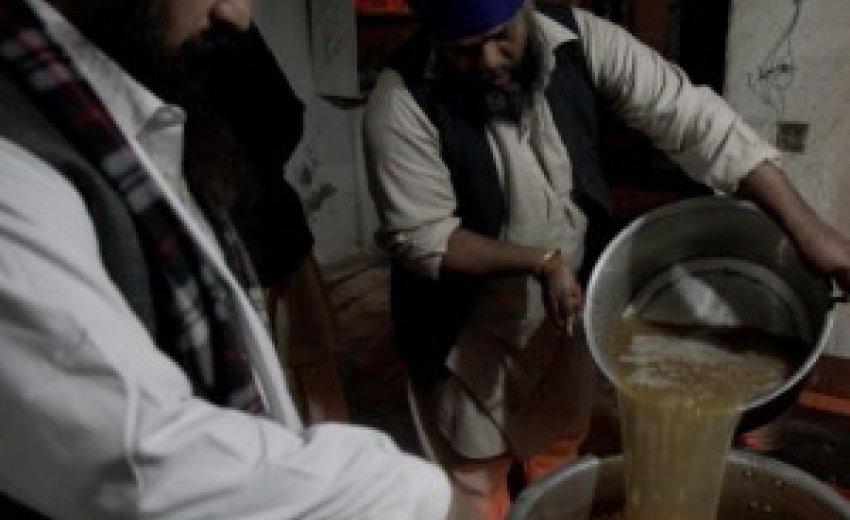The main place of worship and a communal canteen are both a stronghold and refuge for a community facing extinction.
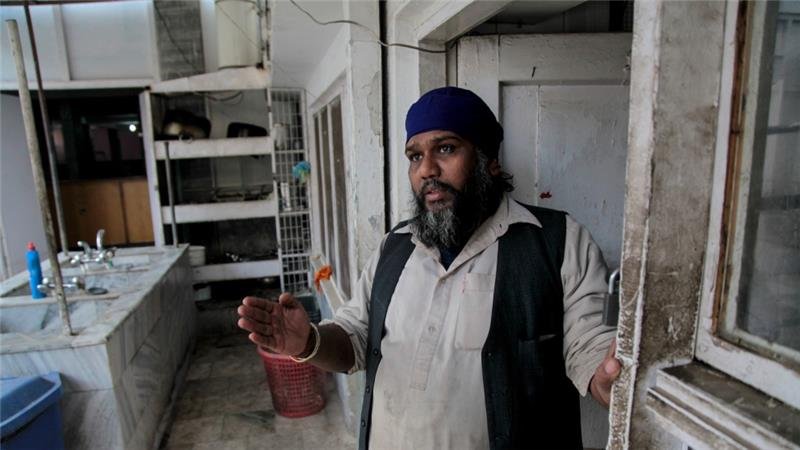 |
| Mukesh, the head cook at the Karte Parwan Gurudwara, the central place of worship for Kabul's dwindling Sikh community [Sune Engel Rasmussen/Al Jazeera] |
05 Jan 2016: Kabul, Afghanistan - On December 16, Mukesh woke just before 5am. He smoothed down his shirt, slipped on leather sandals, and shuffled out into the dark courtyard of the Karte Parwan Gurdwara, the main place of worship for Kabul's Sikh community.
Mukesh, 40, who only goes by one name, walked quietly to the cold kitchen, flicked on the lights, and began preparing the morning "langar".
Like all Sikh gurdwaras, the Karte Parwan Gurdwara has a langar - a free kitchen serving daily vegetarian meals to visitors. Langar is one of the Sikhs' most sacred traditions, with simple rules: everyone is welcome, whether or not they are Sikh, and people eat the same meal, shared together.
Sivender Singh, another gurdwara resident, arrived to help. Together they poured canola oil into an enormous iron cauldron, and waited for it to heat, warming their hands holding steaming cups of sweet green tea.
"In the past there would have been dozens of people here helping, many cauldrons," Mukesh said, motioning to the expansive empty kitchen space behind him. "Not any more."
Not so long ago, Kabul's largest gurdwara prepared food for hundreds, sometimes thousands, of worshippers. These days, on average, there are only a few dozen mouths to feed.
That's because Afghanistan's once thriving Sikh community is facing extinction.
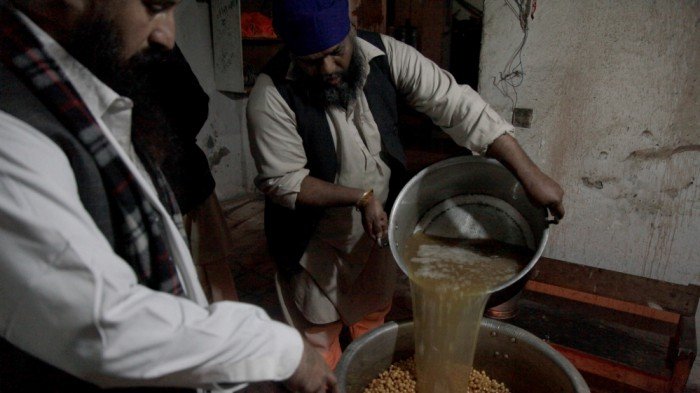 |
| Mukesh and Sivender Singh, another resident of Kabul's Karte Parwan Gurdwara, prepare the chole, a chickpea curry, for the morning langar [Sune Engel Rasmussen/Al Jazeera] |
Shrinking community
Official census figures do not exist, but according Rawali Singh, deputy head of the Afghanistan Sikh and Hindu Community Council, about 40 years ago, an estimated 50,000 Sikh and Hindu families lived in Afghanistan.
That number has shrunk to around 363 families, the vast majority of whom are Sikhs, and has steadily declined in recent years, largely due to persistent social discrimination and prejudice.
In Kabul, only 102 Sikh families remained, said Rawali, and in the past year alone, more than 150 families have left Afghanistan.
In other areas of the country, such as Jalalabad and Kandahar, where Afghan Sikhs once lived in large numbers, at most only a few dozen families remain.
Afghanistan's constitution formally enshrines Islam as the country's official religion. But it also protects the rights of Sikhs, and members of other faiths, to practise their religion freely.
"On paper we have equal rights, but I can't go out at night," said Koljeet Singh, a shopkeeper. Like many of the men who live at the gurdwara, Koljeet sent his family to live in India a few years ago, remaining behind only to take care of his business.
In line with his beliefs, Koljeet always wears his distinctive turban, and other Sikh religious articles of faith, known as kakkar, which in Afghanistan, he said, makes him vulnerable to violent attacks, such as beatings, or harassment.
"With these I cannot hide," he said, pointing to some of the kakkar: a metal bangle, uncut beard, and a small curved sword worn strapped to his body.
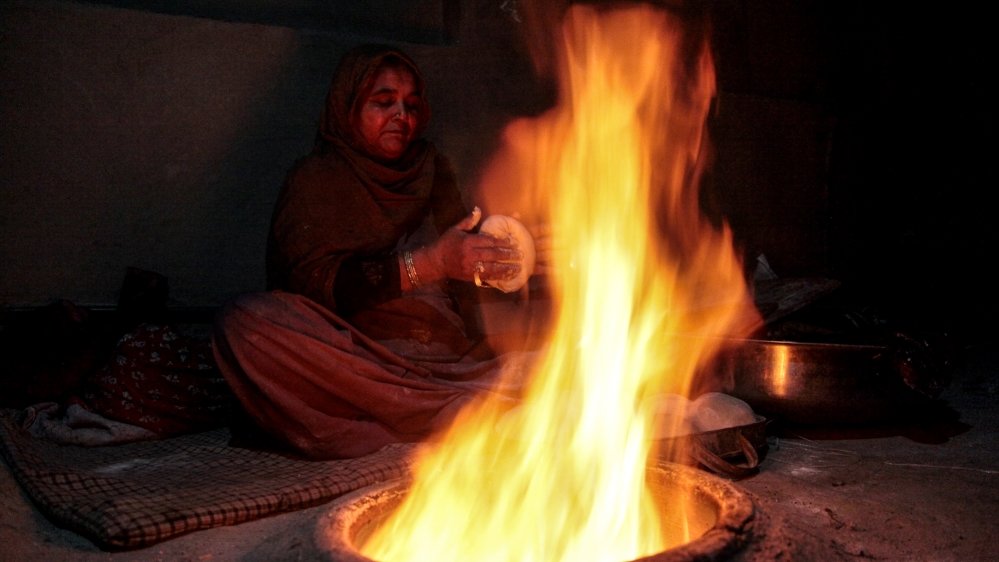 |
| Most of the family of Surjeet Qar, a widow who lives in another Sikh shrine in Kabul, left Afghanistan during the civil war [Sune Engel Rasmussen/Al Jazeera] |
Sikh exodus
The most significant Sikh exodus from Afghanistan occurred during the civil war (1989-1996) and the and during the subsequent Taliban rule (1996-2001), during which thousands, like many other Afghans, sought refuge in neighboring countries.
Life under the Taliban was a particularly dark time. Officially, Taliban commanders were ordered by their leadership to respect Sikh and Hindu communities, on the condition they didn't proselytise and paid jizya, a religious tax imposed on non-Muslims.
But they also required Sikhs to publicly identify themselves, by wearing yellow patches on their breast pocket or armbands, and to mark their homes and businesses with yellow flags. They were allowed to continue daily prayers at the gurdwaras so long as they couldn't be heard from the street, but it also wasn't uncommon for errant Taliban to harass or beat them, Koljeet said.
Even after the fall of the Taliban, however, and promises by both the Karzai and Ghani governments to do more to protect their communities, each year, the number of Sikh families continues to shrink.
"Before the wars we were integrated in local communities," said Sivender. "But with the passing of time the prejudice against us has increased. People were really radicalised by the civil wars and the Taliban."
Some in Afghanistan have been particularly intolerant of Sikhs cremating their dead, a practice forbidden in Islam. Protesters have interrupted funeral processions by throwing stones and shouting insults, forcing the Sikh community to request police protection so they can mourn in peace.
During the civil war, local commanders from different sides illegally confiscated housing and land from many Sikhs, and Muslims were also discouraged from doing business with them, impoverishing the minority.
"I would have left if I could afford it," said Surjeet Qar, a widow who lives in another Sikh shrine in Kabul.
Surjeet had also arrived before dawn to the Karte Parwan Gurdwara, and sat in the tandoor room, to prepare fresh bread for the langar. She worked quickly, slapping the dough into shape before firing it in the open oven.
One by one, Surjeet's extended family left Afghanistan during the civil war. After her husband was killed in a car accident, her home was illegally seized, giving her no choice but to move into the shrine.
"I miss them a lot; family is like part of your body," she said.
But, she emphasised, proudly showing her own kakkar, a small curved sword, she took comfort in the remaining Sikh community, and said volunteering for the langar gave her a sense of purpose.
"I'm here to serve God and my community," she said. "These people have been my brothers for the past 30 years."
In the kitchen, Mukesh watched Sivender drop dough into the hot cauldron oil to make pakora, a deep-fried appetiser common in Indian cuisine. But this one had a special Afghan touch: in addition to the usual flour, oil, ginger, garlic, spices and coriander, the batter was studded with fresh pomegranate seeds.
The first batch was ready by 5:10am. "I am the guru of food here," laughed Mukesh as he was complimented on the hot, delicious food.
Mukesh isn't himself a Sikh, nor is he Afghan. He's a Hindu, from India, and his Sikh wife and three young children live in New Delhi. He was working in Dubai when his uncle, who prepares food in a langar for a gurdwara in Pakistan, told him the Karte Parwan Gurdwara needed a new cook.
"I miss my children, of course," said Mukesh, as he began to cook a large pot of chole, a chickpea curry, stirring rapidly as steam filled the room.
But his uncle's message "was God's intervention for me", he said. To him, cooking for the langar is a spiritual pursuit - "a type of worship".
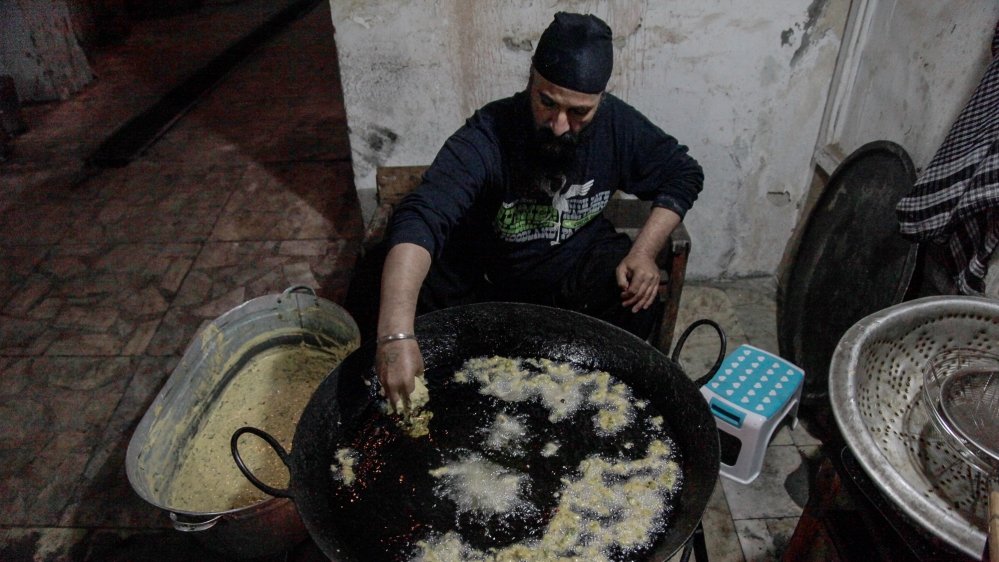 |
| Sivender Singh, a gurudwara resident, drops the first batch of pakora batter into the hot oil just after 5am [Sune Engel Rasmussen/Al Jazeera] |
A small, tight-knit community
Despite dwindling in size, Kabul's Sikh community has retained a strong sense of community. The gurdwara rooms, which once stored hundreds of bags of flour and rice to feed thousands of worshippers, are now simple bedrooms for dozens of Sikhs with nowhere else to go.
The residents rarely eat outside the gurdwara. While leaders say anyone is welcome - they rarely see visitors from outside their community, apart from the occasional official or foreigner.
Some of the community members are vegetarian and concerned about the use of animal products in food, Surjeet explained. Meat is not allowed to be consumed at the gurdwara, but some still do eat it, but only if it is slaughtered according to Sikh custom. With all meat sold in butchers and served in restaurants in Afghanistan prepared according to Islamic principles, the Sikh community will only eat meat they prepare themselves.
"We live together, we help each other and we prepare the food together," said Mukesh. "And we eat together, here in God's house."
That day was particularly special for Kabul's Sikh community. It was the first day of their calendar month, when almost all the remaining Sikhs traditionally come from across Kabul for morning prayer and the langar, but it was also the anniversary of the martyrdom of Guru Tegh Bahadur, the ninth of the 10 Sikh gurus.
In the late 17th century Guru Tegh Bahadur, a Sikh from Amritsar in India's Punjab state was sought out by a Hindu community to intervene in the Mughal Emperor Aurangzeb's efforts to forcibly convert them to Islam. When the guru appealed to the emperor, he was asked to convert or perform a miracle. He refused, and was arrested and publicly executed in 1675 in Delhi on the emperor's orders.
"Guru Tegh Bahadur was an exceptional man," said Mukesh, as he handed out milky, sweet cups of masala chai, with crushed spices floating on the surface. "He saw all people as equal, everyone as a human being."
"The message of today is tolerance," added Koljeet. Even if their community faced discrimination, he said, "if we retaliate when they attack us we become just like them."
Upstairs in the brightly lit shrine, with mirrored walls and carpeted ceilings, Guru Grand Submaraj had been sitting since 4.30am, cross-legged and barefoot, knees covered in a thick blanket, reading the morning's prayer over a loudspeaker.
The first handful of worshippers arrived just after 7am. Men sat on one side, women, wearing colourful, jewelled skirts and fringed head scarves sat opposite, huddled around a bukhari, a traditional Afghan wood heater. Submaraj began to sing, and played the harmonium, while the worshippers listened or quietly read aloud to themselves from palm-sized prayer books.
Numbers began to swell at 8am, as members from the Sikh community around Kabul arrived at the Gurdwara for their special celebration. Suddenly, from the usual group of fewer than 40 worshippers, there were a couple of hundred men, women and children, probably almost the entire Kabul Sikh community, gathered together in the one room.
As the praying continued upstairs, Mukesh made the final langar preparations, carrying piles of Surjeet's freshly made bread into the eating hall on the ground floor. Bored and hungry, a few dozen young boys filtered down to the hall and practised their kung fu moves on each other as they waited for breakfast.
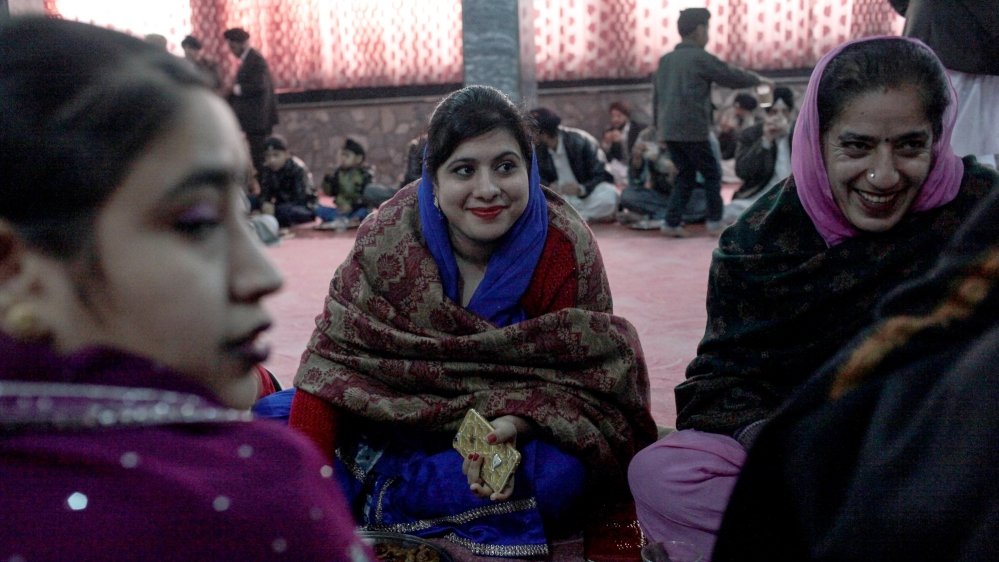 |
| The langar provides the dwindling community the opportunity to come together, catch up and reconnect [Sune Engel Rasmussen/Al Jazeera] |
We eat so 'our hearts heal'
Sikh children commonly face taunts and discrimination in Afghan schools, resulting in many of the remaining families to send them to be educated abroad. Koljeet, who can trace his Afghan lineage back four generations and served in the Afghan army for seven years, said that while he "feels Afghan in [his] heart", his children are much happier living in India.
One day, Koljeet said, his nephew had returned from school devastated. The school had organised an official ceremony for Teacher's Day, and the school principal decided his nephew wasn't allowed to participate. The boy wasn't a real Afghan, the principal said, and he would have to wait outside, by himself, until the party was over.
"He was humiliated," said Koljeet. "He said that was enough, he wasn't going back to school again. The entire family then decided we had to send all our children to India."
As the prayers finished, the families flooded the eating hall, laughing and smiling. They sat, men on one side, women on the other, in long rows on the floor.
The young boys sprang into action, placing metal plates and chai glasses between the rows, while the men quickly served the hot bread, chole, and pakora on the communal plates.
The younger children buzzed excitedly around the room, and women admired the few babies - the newest additions to their small community. Old friends stood up to cross the room and greet each other.
Guljeet Gul, 33, looking around the room, said it was clear the numbers of Afghan Sikhs shrank each year. "So many have left, and they aren't willing to come back," she said. For her, this meant the large monthly langar meals, like today, had become increasingly important to the community.
"It's an opportunity to honour our religion together but it's also social," she said, as a handful of pakora was dropped on her plate. "We pray upstairs to clean our heart. Then we come downstairs here to eat together. That's when our hearts heal."
After hours of preparation, the eating was over in less than 20 minutes, and the room emptied as quickly as it had filled.
Mukesh stood watching as the young boys dutifully gathered the discarded plates and returned them to the kitchen. Smiling broadly, Mukesh said it filled him with joy to see the small community come together.
"Look at all the cleaning we have to do," he laughed, as the dirty plates piled up. "But I'm very happy."
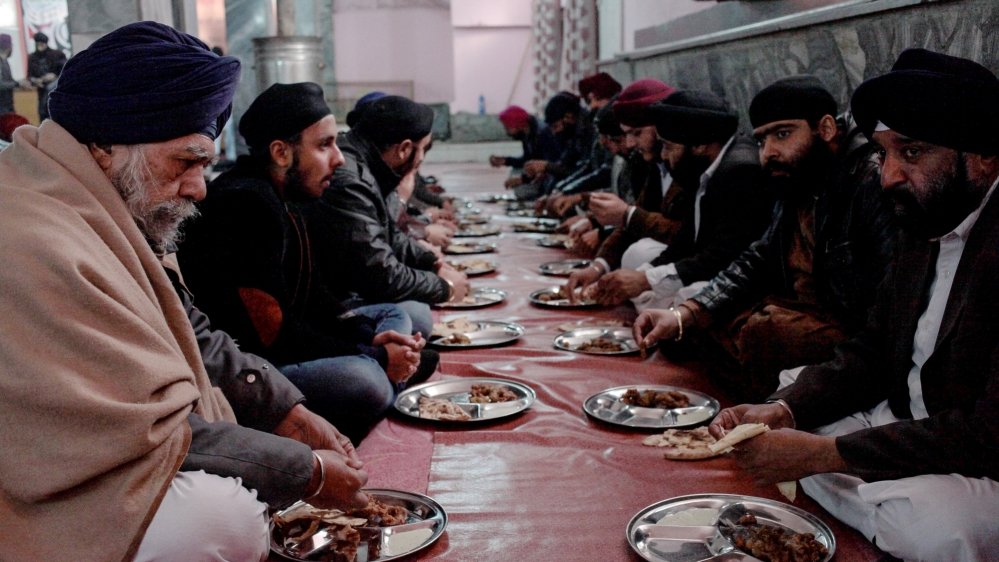 |
| Afghan Sikhs eat breakfast together at the langar in mid-December; the small community come together every month to share a communal meal [Sune Engel Rasmussen/Al Jazeera] |
Source: Al Jazeera
